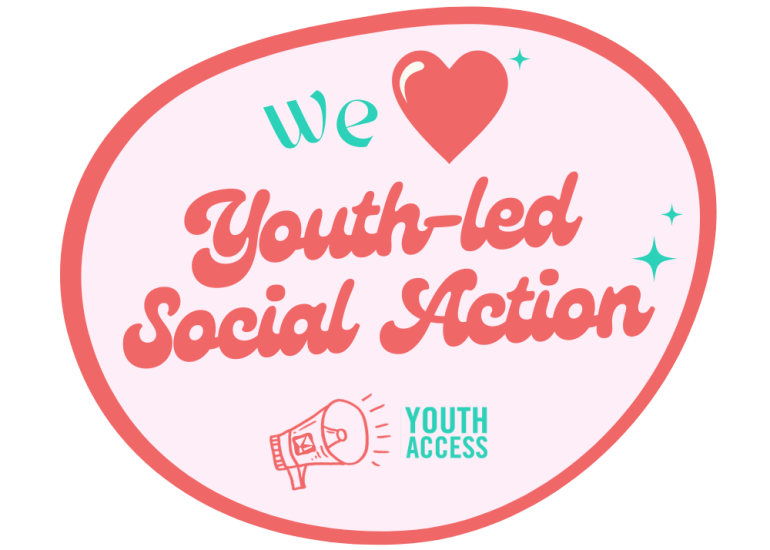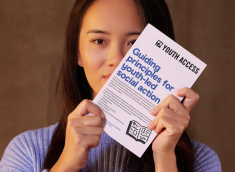Young people want to (and often do) lead change
Young people have by far the most at stake when it comes to policy-making. Whether that’s policy directly affecting them here and now, like how their local youth service is run, or whether it’s big national and global policies, like managing the economy and tackling climate change, it’s younger generations who’ll face whichever future decision-makers leave them with, and thus, young people who clearly have the most skin in the game.
But too often, they’re left out of these decisions, and they’re not happy about it.
Over five decades of data gathered by Cambridge University shows that young people’s faith in democratic politics is now lower than any other age group. In fact, 18-to-34-year-olds’ satisfaction with democracy is declining at its steepest rate since 1973.
It follows suit then, that many traditional ‘change-making’ spaces are poorly accessed by younger people. Eighteen to 24 year olds are the least likely to turn out to vote (while under 18s are excluded from the ballot box almost entirely). A meagre 2% of charity boards have a trustee under 25, and youth membership of trade unions is at an all time low.
Those of us who work with young people know that the problem isn’t that they don’t care. They are the most passionate, inspiring and motivated advocates for change. And the data backs this up. The European Commission's Flash Eurobarometer on Youth and Democracy showed a 17% rise in the number of young people active in youth organisations dealing with environmental, human rights and global development issues from 2019-2022. A 2022 youth-led review of youth trends in activism found that not only were young people dubbed as the key participants in various progressive social movements around the world, they were actually right at the forefront.
From the young people embracing social media to mobilise swathes of their peers in the Arab Spring of 2011, to the school climate strikes of 2018 fronted by a 15-year old Greta Thunburg, the Black Lives Matter movement driven by young people of colour and the recent Trans Kids Deserve Better activists occupying of NHS England’s HQ - young people are consistently the demographic showing bold leadership, embracing new technologies and engaging their peers in the drive for justice.
This is the reason that Youth Access wanted to develop these ‘Guiding principles for youth-led social action’. As an organisation that takes a rights-based approach to its work with and for young people, it’s vital that young people’s right to participate - to be heard and to take action on the issues affecting them - is central to the work of Youth Access, and its members.

A guide for genuinely youth-led, inclusive and impactful social action spaces
These principles were co-produced with young people who are involved in leading change, as well as the organisations that support them. They offer a framework for setting-up, expanding and improving change-making spaces for young people, based on the experiences of those young people, leaders and staff who are already doing great, youth-led work on issues such as refugee rights, access to mental health services and support for trans young people.
As guiding principles, they are not designed to be a step-by-step ‘to-do’ list. Those steps can only (and should, absolutely!) be developed in partnership with young people from the communities where you’re trying to influence change. Instead, the principles should act as a conversation starter, a prompt for reflection and a regular reminder for how to embrace the power of young people in change-making. Vitally, they’re also for young people themselves: to help make the case for their own rights and to encourage accountability in the organisations supporting them. These principles should spark conversations, support prioritisation and - most importantly - inspire action.
What’s in the principles?
The principles cover three areas:
- Culture - covering the key values of a genuine culture of youth-leadership
- Inclusion - aiming to help ensure our change-making spaces are actively inclusive of the communities who are most affected by injustices and too often left out of activist spaces
- Impact - aiming to bridge that gap between youth work and youth activism - ensuring young people have opportunities to develop personally, while also seeing real-world change as a result of their activism.
Each area offers a set of principles, supplemented by ideas for action and reflection.
We would love to see these used as a basis for workshops with young people, embedded into organisational strategy, referenced in staff supervisions, printed and hung up on posters in your offices… whatever it takes to make them come to life.
Help to make these principles part of the living, breathing fabric of our social movements. Read them, discuss them, pledge your commitment to making them happen, then really, truly, let young people lead.

